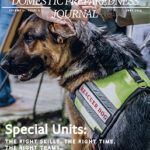
Archives

Disaster survivors and responders often face psychological hazards like acute stress disorder, depression, and post-traumatic stress. These issues are worsened in multilingual communities, where language barriers hinder communication and delay aid. Effectively addressing these challenges goes beyond basic translation or ad hoc interpreting to address the whole community.

Disaster Stress Management in an Emergency Operations Center
May 7, 2025
Disasters affect responders and community members, but they also bring trauma to those working inside emergency operations centers. Distance from the scene does not create a shield from stress. Secondary traumatic stress can impair leadership, so managing this stress is vital for effective emergency response.

A Holistic Strategy for Responders’ Well-Being
May 7, 2025
First responders and emergency managers face constant, high-pressure stress from trauma, long hours, and critical decisions. This often leads to chronic stress, increasing risks of heart disease, mental health issues, and substance abuse. Their ability to help others depends on prioritizing their own well-being through proactive self-care.

Back to the Basics: Navigating Crisis Leadership
February 19, 2025
From historic catastrophes to today’s challenges, crises pose significant public threats. By returning to the basics and prioritizing deliberate preparation, organizational leaders can build greater resilience, enhance performance, and lead effectively when it matters most.





